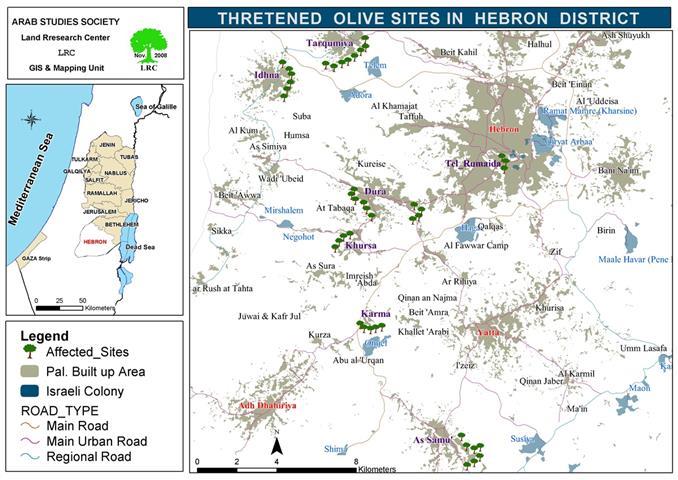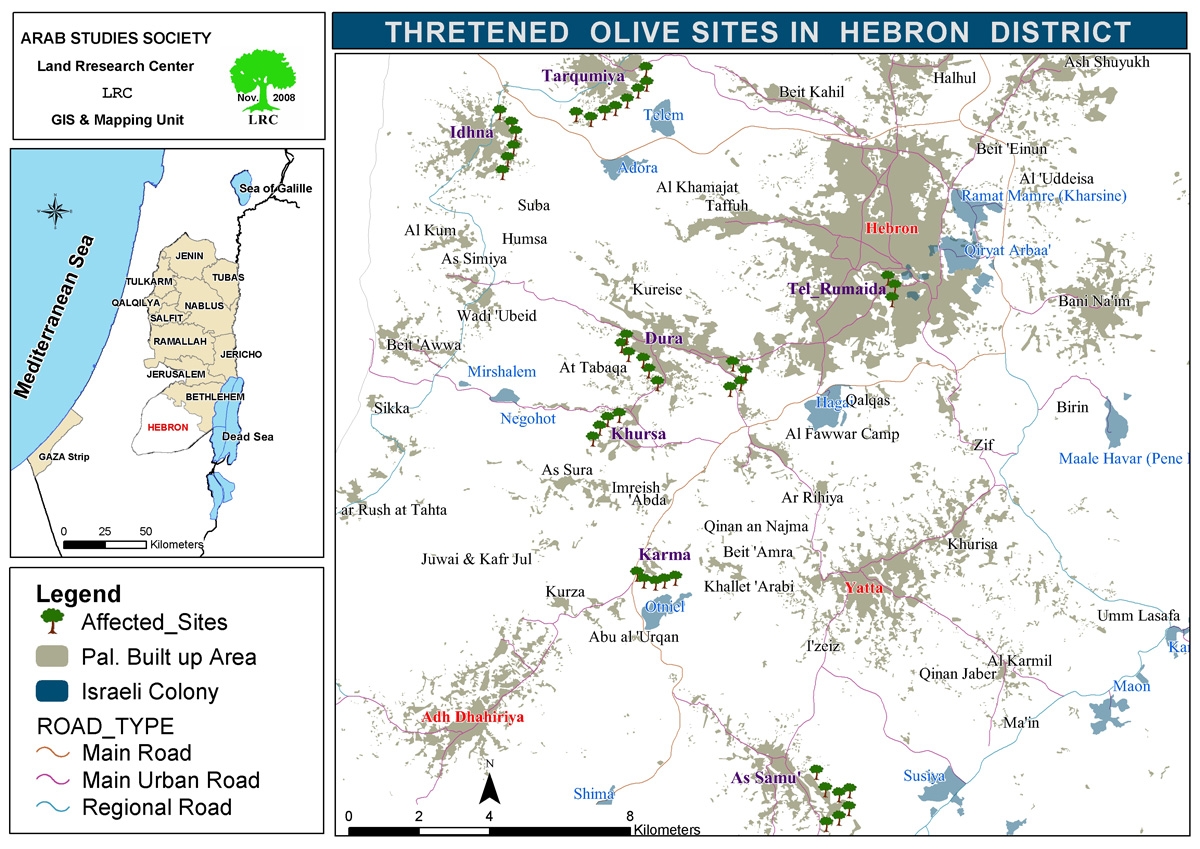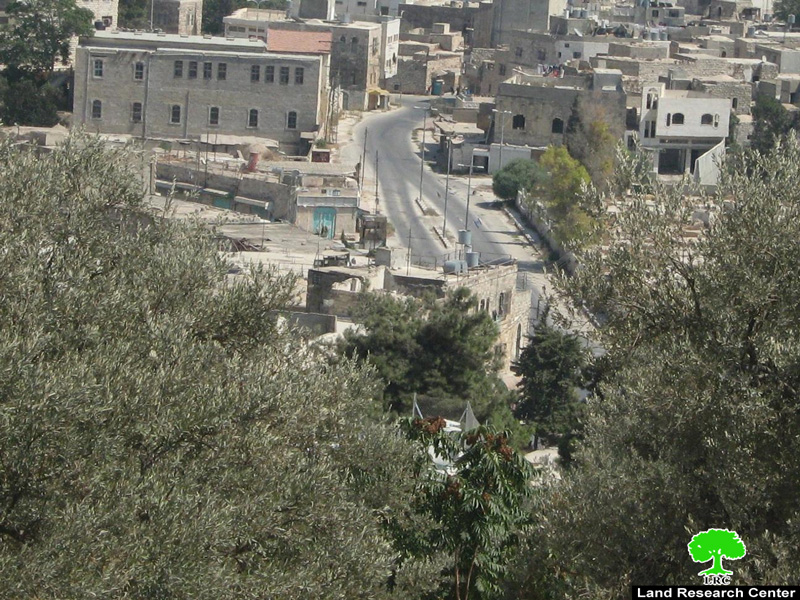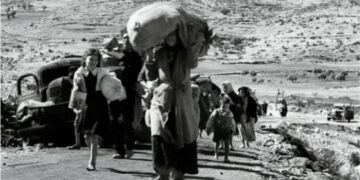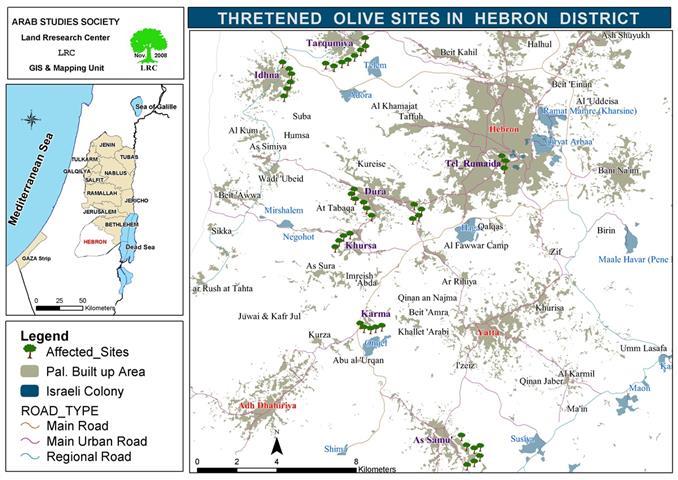Introduction:
No tree in history has seen a real fierce war waged against it such as the olive tree in Palestine. Israeli occupation forces have declared a systematic war against this tree in the form of uprooting and destruction on the hope that, by so doing, they are wiping out an important pillar of the Palestinian identity. The tree has become a target of Israeli assassination and liquidation as thousands of olive trees were either uproot or cut down to make space for further future colonial expansion.
Photo 1: Old Roman olive trees in Tel Rumeida witness to its presence long before the Israeli colonists.
Olive and olive oil used to form a major part of the Palestinian farmer’s income in the yester years. However, because of the low price of oil (due to the fact that it is prohibited from being exported), collecting and processing oil has become a losing endeavor economically speaking. However, despite the low price, the inability to export, the inability to reach olive fields, due to closures, the Israeli Racist Isolation Wall and the attacks of the colonists, the olive tree still survives in the minds, hearts and consciousness of every Palestinian. That is due to the fact the that the olive tree is considered to be a social and folkloric value in its own right that is linked to the Palestinian heritage and history as there isn’t any Palestinian home that doesn’t olive oil.
Israeli occupation forces and colonists are the number one enemy of the olive tree as they have fought against it using all possible means despite its religious and historical values. The uprooting of olive trees by these forces and the burning and cutting of its branches are evidences of their hate and disregard to all what resembles peace and harmony. Around 34,000 dunums filled with olive tress are affected by Israeli occupation regimes and instructions, including the 19,000 dunums isolated beyond the Racist Wall and the 15,000 dunums located in the vicinity of colonies and by-pass roads to which Palestinians are not allowed to access as they are considered to be “Closed Military Areas.” However, despite all of the Israeli practices, Palestinian farmers still continue to plant and care for this holy tree as they do for their children and grandchildren.
The olive picking season is almost over. Israeli occupation forces and Israeli colonist have done their utmost to prohibit Palestinian farmers from collecting their olives; sometime occupation soldiers have barred Palestinians from reaching their land while sometimes they’ve arrested them. Israeli colonists have joined the prohibition as they have hit and beaten Palestinian farmers while, in other instances, they’ve burnt fields filled with olive trees.
Photo 2: Olive Orchards near the colony of Otna’eil
Local, regional and international media have reported a number of cases during which Israeli colonists have chased Palestinians out of their lands during the harvest. A prime example is what took place in Tel Rumeida when a group of colonists attacked Palestinian farmers, journalists and a number of international volunteers under the watchful eye of the Israeli occupation soldiers who did not do a thing to stop the attacks. A much larger number of cases, however, go unreported.
Photo 3: A Palestinian farmer waits for his olives to be pressed.
The Land Research Center (LRC) has decided to accompany a number of Palestinian farmers in their attempt to reach their olive tress located in the vicinity of the colony of Otna’eil. The goal was to get a first-hand look at the dangers Palestinian farmers face while trying to practice their basic right of reaching their lands and collect their crops.
On Sunday October 26th, 2008 LRC, international and Palestinian volunteers accompanied the residents of the village of Karma toward the Abu Sheikha olive grove near the said colony. The group started heading towards the grove in the early morning hours. Upon arrival, the group was surprised to find out that most of the olives were harvestedstolen by Israeli colonists well before the arrival of the group. However, the joy of the Palestinians to have actually reached and touched their trees for the first time in years left them speechless. But not for long……
Photo 4: Palestinian farmers and international volunteers were obliged to use
rough mountainous roads to by-pass Otna’eil colonists
Photo 5: International volunteers help Karma villagers in collecting
remains of olives near the colony of Otna’eil
As Palestinian farmers and the international volunteers were collecting the leftover olives, armed Israeli colonists began to assemble atop their colonial units. Shortly afterwards, military jeeps started poping up from all directions while soldiers began shouting that the area has been declared a “Closed Military Area.” Two of the international volunteers were arrested while trying to “reason” with the commander of the Israeli forces. The head of Karme village council, Mr. Jibreel Abu Sheikha, and Mr. Husam Abu Sheikha were also arrested. The confrontation continued until all of the Palestinians were evicted from their lands in the colony and its vicinity. Those arrested were released after two to three hours. After his release, the head of the village council said that he was shown a military order indicating that:
The olive grove is a Closed Military Area to which entrance in prohibited.
The occupation forces, also, told Mr. Abu Sheikha that the colonists are the rightful owners of the said lands, not the Palestinians !!!
Photo 6: Palestinian Lands lacking plowing pruning services.
The Karma incident was not the first or the last such incident. As long as the colonists are still present atop Palestinian lands, similar violations are expected to take place and to continue in the future. LRC has documented the violation committed by both the occupation forces and the colonists in the Governorate of Hebron during the 2008 olive harvest season. The violations are listed in the following table:
|
Date of Violations |
Place |
Type of Violation |
|
October 5th, 2008 |
Across from Kiryat Arba colony – Hebron |
Israeli colonists from the colonies of Givat Havot and Kiryat Arab attacked Israeli members of Rabbis for Human Right who were trying to assist Mr. Abdel Kareem Al Jabari in collecting his olives from his land located between the two colonies. Mr. Abdullah Al Fakhouri was also injured. |
|
October 17th, 2008 |
Wadi Al Nasara – Hebron |
Israeli colonists threw stones at Palestinians and international volunteers trying to collect olives. When Israeli Blue Police arrived at the scene, they forced Palestinian farmers and the internationals out of the land. The colonists attacked a number of the Palestinians including Mr. Mohammad Ali Dana. |
|
October 18th, 2008. |
Tel Rumeida – Hebron |
Colonist attacked Palestinian farmers and beat the journalist Abdel Hafeez Al Halshlamoun who received multiple bruises. |
|
October 20th, 2008 |
Tarqumiya |
Colonists attacked Mr. Mohamamd Yousef Oudeh while en route to his land. Palestinian farmers were denied access to their 1200 dunums of land including 500 dunums located in the vicinity of colonies while the remaining 700 dunums are located behind the Racist Wall. |
|
October 22nd, 2008 |
The colony of Otna’eil – near the town of As Samu’ |
Colonists chased off Palestinian farmers during the olive harvest. The colonists used rocks and metal objects while some were carrying semi-automatic weapons. They have damaged a number of Palestinian cars and beat members of Abu Karsh clan. The colonists managed to prevent the Palestinians from reaching their 100 dunum land. |
|
October 24th, 2008 |
West Dura villages |
Israeli occupation forces did not allow Palestinians whose lands are located behind the Wall from using their vehicles or tractors. Only donkeys were allowed to be used. |
|
October 25th, 2008. |
Wadi Al Nasara |
Israeli occupation forces prevented Palestinians and 30 international volunteers from reaching the olive grove using the pretext that the area is a “Closed Military Area.” |
|
October 26th, 2008 |
Karma village south of Dura |
Israeli occupation forces and colonists forced Palestinian and international volunteers out of the olive groves. Two internationals and two Palestinians were arrested for a while. |
|
October 26th, 2008 |
Tel Rumeida – Hebron |
Israeli occupation forces prevented Palestinians and international volunteers from picking the olives. A number of international passports were held for some time while Israeli forces threatened to arrest the volunteers. |
|
November 3rd, 2008. |
Tel Rumeida – Hebron |
Colonists beat Palestinian farmers and injured the boy Yousef Hisham Al Azza. They, then, stole quantities of the collected olives. |
Photo 7: A Palestinian farmer collecting olives from his olive grove
near by-pass Road 60 next to As Samu’ junction.
Pictures Illustrating the War-at-Olives in Hebron:
Photo 8: Olive groves surrounded by an Israeli colonial road & the Israeli Segregation Wall in the village of Dier Al Asal west of Dura Town.
Photo 9: Israeli occupation forces build a bridge as part of a colonial road west of the village of Sikka near Palestinian olive groves.
Photo 10: An Israeli bulldozer preparing the land for a colonial road near an olive grove west of the town of Idhna
Photo 11: Hebron olive trees overlooking Al Shuhada Street which is closed by the occupation forces for years.
What Next??
Israeli occupation in its totality (including the occupation forces and the colonists) has transformed the olive harvest season in Palestinian minds from a joyous occasion to a season of agony; according to Mr. Abu Sheikha:
We used to look forward to the harvest season. Nowadays, we are praying to Allah to delay it as it’s become a season filled with anguish and distress. We are afraid that we might lose a relative or a close friend during the season as colonists do not hesitate to attack us, let their dogs maim us and even to open fire at us.
As for Mr. Hashem Al Azza, he indicated that: ' There is an entrenched animosity between the Israeli occupation and the olive tree because the tree is the biggest witness to the fact that the land is Arabic and it will never be Israeli.'
As such, the LRC strongly recommends that the Palestinian and Israeli political levels directly interfere in an effort to put a halt to these attacks which help only to increase tension in the area. Such tension can explode at any moment leading to situations that nobody can predict.
Prepared by:
The Land Research Center
LRC


